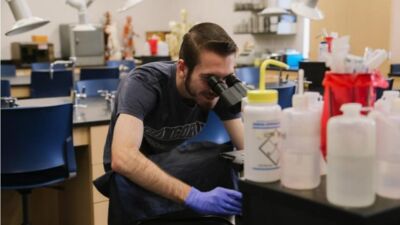Careers for Natural Scientists

“Natural science” is a wide-ranging title for areas of study including chemistry, physics, biology, environmental science, geography and more. For students interested in studying any aspect of God’s creation, choosing a career involves considering a long list of options. Whether you’re a first-year college student at Concordia Nebraska or just about to graduate and pursue a career, these ten “job titles” for natural science students are a great way to look at some of your wide-ranging options.
Park ranger
Park rangers can work in a variety of natural locations, including national and state parks, forests and monuments. They may be employed in any part of the country, depending on their interests and passions. Typically, park rangers guide tourists through a park, educate visitors, complete maintenance duties and even enforce rules related to a park’s conservation. Most park rangers hold at least a bachelor’s degree in environmental science or a related field. Their median salary is $45,000.
Environmental technician
For environmental science students, becoming an environmental technician is one of many unique, exciting career options that enable them to work in laboratories, offices and the field. Environmental technicians’ duties are focused on maintaining the quality of the natural world, including soil, air, water and more. They may examine samples in a laboratory, track levels of contaminants or pollution or inspect public spaces to ensure that they align with environmental regulations. Salaries for environmental technicians are typically around $50,000.
Geographer
Many geographers work for federal agencies, including those in foreign policy, defense and national security. They may also work in national parks or other places in the field. Geographers typically utilize technologies like GIS, mapping systems, satellite imagery and photography. They might map the physical environment or track the distribution of human populations across a region. Most positions require at least a bachelor’s degree, while others, especially those in research, require a graduate degree. Salaries range based on education and job location, but average $90,000.
Clinical laboratory scientist
At Concordia Nebraska, the pre-clinical laboratory science program prepares students for work in a medical setting, where they can perform laboratory tests contributing to the diagnosis, treatment and prevention of disease. Clinical laboratory scientists may analyze blood and other tissue samples, perform cell counts and match blood samples for transfusion. Typically, a bachelor’s degree is required for employment, as well as possible licensure depending on one’s location. Salaries average $60,000.
Health educator
Health educators, also called health education specialists, specialize in teaching others about conditions affecting well-being. They may work in hospitals, nonprofits or government agencies, where they assess the needs of various populations and develop educational programming to serve them. When serving the public, health educators may address topics like emergency preparedness, nutrition and immunizations. In healthcare settings, they may work with clients on a more individualized basis. Salaries for health educators, on average, are around $62,000.
Nurse
Nurses come in many forms, from registered nurses to nurse anesthetists and nurse midwives. Wherever healthcare needs exist, nurses are there. Depending on their level of education and years of experience, nurses may fulfill any duties from giving patients medicine to operating their own private practice as an Advanced Practice Registered Nurse (APRN). Salaries for nurses vary greatly based on educational attainment – while registered nurses typically make around $86,000, nurse practitioners, midwives and anesthetists can make $130,000 or more.
Chemical engineer
Students with a solid undergraduate background in chemistry, engineering and other related areas can find entry-level work in chemical engineering – the application of natural science methods to chemical manufacturing. While Concordia Nebraska does not offer an undergraduate degree in engineering, the university’s pre-engineering program sets students up well to pursue further education in the field. Chemical engineers typically earn $110,000 or more.
Medical physicist
Medical physics occurs at the unique intersection of physics and healthcare, where professionals use the principles of physics to develop new technologies or devices for radiation and other treatments. Typically, medical physicists must hold a bachelor’s degree in physics or a related field as well as a master’s degree in medical physics. Most complete residency programs, and many further their studies in a doctoral program. Salaries for physicists typically range from $150,000-$300,000.
Forensic scientist
At the intersection of criminal justice and the natural sciences lies the field of forensic science. As a forensic scientist, you will be responsible for analyzing crime scenes and evidence to determine what should be recorded and how it should be analyzed. Techniques of DNA analysis, toxicology, microscopy and others are useful in this field. Students who wish to become forensic scientists should take courses in physical science and forensics. The median salary for forensic scientists is $64,000.
Agricultural Manager
For agriculturally-inclined students, managing a farm or other agricultural operation is a leadership-focused role that combines the natural sciences with business principles. Agricultural managers may specialize in producing crops, livestock or dairy products. They must have the knowledge and skills necessary to maintain their production levels as well as running the farming business. Salaries vary widely but typically average around $83,000.
The natural science department at Concordia University, Nebraska provides students with strong foundations in inquiry, discovery, research and critical thinking that prepare them for one of many paths into graduate school or the workforce. Learn more about science and math programs at Concordia Nebraska here.
Interested in science at Concordia University, Nebraska?
Related Stories


